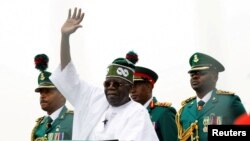The ruling gave Tinubu a clear mandate to govern Africa's most populous nation, which is grappling with double-digit inflation, foreign currency shortages, a weakening Naira, widespread insecurity and crude oil theft.
The judgement passed by seven Supreme Court judges, was final and followed a pattern seen in previous presidential elections that have been challenged in court.
Supreme Court judge John Okoro said, "there is no merit in this appeal, and it is hereby dismissed."
None of the attempts by Tinubu's rivals to overturn the results have been successful.
An election appeals court last month rejected petitions by two opposition candidates, Atiku Abubakar of the People's Democratic Party, PDP, and Peter Obi of the Labor Party, LP.
The opposition candidates had alleged voter fraud, violations by the Independent National Electoral Commission, INEC, and claimed Tinubu did not meet the constitutional requirements.
Along with its original claims, Atiku's legal team also sought to introduce new evidence.
The PDP lawyers claimed to have evidence that shows Tinubu submitted a forged certificate from the Chicago State University as a qualification to the election commission when he applied to run for president.
Senior leaders of the ruling All Progressives Congress, APC, have dismissed those claims, however, the political rivals argued on television and social media over the forgery claims.
After February's election, INEC acknowledged "glitches" in the voting process, but dismissed claims it had not been free and fair.
Critics and the opposition said delays in uploading results and technical problems created opportunities for ballot rigging.
A former Lagos governor, Tinubu won 37% of the vote in February, beating his rivals in one of the tightest votes in Nigeria's modern history.
Several elections in the West African nation's history have resulted in legal tussles since the country emerged from military rule in 1999, but the Supreme Court has never overturned a presidential election.
Vowing an agenda of "Renewed Hope," Tinubu took office in May and has quickly introduced reforms his government argues will help grow Africa's largest economy and attract more foreign investment.
Tinubu's administration is also tackling huge security challenges, from a long jihadist insurgency in the northeast to kidnap gangs, inter-communal clashes and separatist agitations in other parts of the country.
Information for this article came from Agence France-Presse and Reuters.

Forum